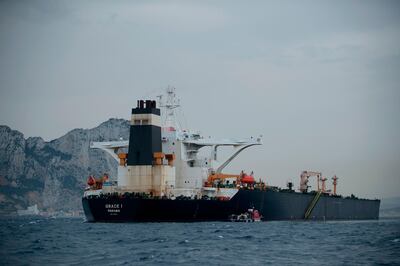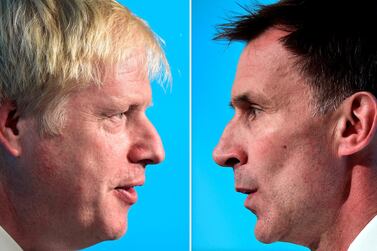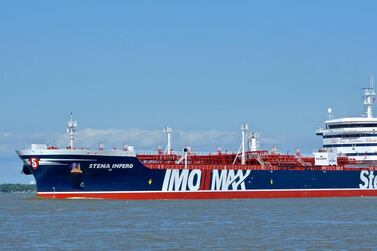The UK has branded Iran's seizure of a British-flagged oil tanker in the Gulf as "illegal interference" and rejected Tehran's explanation that it took the vessel because it had been involved in an accident.
UK Foreign Secretary Jeremy Hunt said the action was "totally and utterly unacceptable" and a "clear contravention of international law". According to one report, the government could hit the Iranian regime with a raft of diplomatic and economic sanctions.
Defence Secretary Penny Mordaunt said Iran's move was a "hostile act."
Iran’s revolutionary guard released footage of the Stena Impero being boarded. As several speedboats sped alongside the vast vessel, an Iranian helicopter hovered over the ship’s deck and several men in balaclavas carrying automatic weapons rappelled down a rope.
The video showed Iranian troops using the same method of boarding the vessel as British Royal Marines used to seize the Grace 1 tanker on July 4. British authorities stopped the tanker, loaded with 2.1 million barrels of light fuel oil on suspicion of breaching European sanctions on Syria.
The Stena Impero was captured on Friday evening, a day after Gibraltar’s Supreme Court said it would extend by 30 days the detention of an Iranian tanker seized two weeks ago.
"The ship was exercising the lawful right of transit passage in an international strait as provided for under international law," the UK's UN mission wrote to the Security Council. "International law requires that the right of transit passage shall not be impeded, and therefore the Iranian action constitutes illegal interference."
"Current tensions are extremely concerning, and our priority is to de-escalate. We do not seek confrontation with Iran," the letter, seen by Reuters, said. "But it is unacceptable and highly escalatory to threaten shipping going about its legitimate business through internationally recognised transit corridors."
Mr Hunt said he had expressed "extreme disappointment" at the incident just a week after Iran said it wanted to deescalate the situation in the region during a phone call to his Iranian counterpart, Mohammad Javad Zarif.
"We need to see the illegal seizing of a British-flagged vessel reversed, we need that ship released, and we continue to be very concerned about the safety and welfare of the 23 crew members," said Mr Hunt in a foreign office statement.
He said the Iranian view that the seizure was simply "tit-for-tat" could not be further from the truth.
“Just spoke to ... Zarif and expressed extreme disappointment that having assured me last Saturday Iran wanted to de-escalate situation, they have behaved in the opposite way,” Mr Hunt tweeted on Saturday.
“It raises very serious questions about the security of British shipping and indeed international shipping in the Straits of Hormuz," he later said via a foreign office statement.
Just spoke 2 Iranian FM Zarif &expressed extreme disappointment that having assured me last Sat Iran wanted 2 deescalate situation they have behaved in the opposite way.This has 2 be about actions not words if we are to find a way through.British shipping must & will be protected
— Jeremy Hunt (@Jeremy_Hunt) July 20, 2019
Mr Hunt added that the British government’s emergency response committee Cobra discussed the situation at length and a statement will be given to parliament on Monday regarding the UK’s next steps.
Earlier he said London's reaction would be "considered but robust", and it would ensure the safety of its shipping.
According to The Telegraph the UK government is looking at a range of measures against Tehran, including asset freezes, and could push for UN and EU sanctions to be reimposed.
On Friday, Mr Hunt said the solution would be found via diplomacy and London was "not looking at military options." Britain's government said it had advised British shipping to stay out of the Hormuz area for an interim period.
Britain also summoned Iran’s Charge d’Affaires in London after Tehran’s forces diverted the ship in the waterway, causing a sharp escalation of tensions with a key signatory of the landmark 2015 nuclear deal.
It follows weeks of threats from Tehran to retaliate for Britain's seizure of the Grace 1, including by Supreme Leader Ali Khamenei. Iran claimed that Britain’s actions amounted to “piracy.”
The EU and several European states have backed the UK in condemning the Iranian move and demanding the Stena Impero be released.
Iran’s Islamic Revolutionary Guard Corps impounded the supertanker saying it had broken “international maritime rules” and been involved in a collision with a fishing vessel. Mr Zarif told Mr Hunt that the ship must go through a legal process before it could be released, Iran's ISNA news agency reported. This too echoed the UK’s position that the courts would decide the fate of the Grace 1.
Iran also briefly seized a second UK flagged tanker before releasing it. Tehran also said that the Stena Impero was not loaded with cargo when it was taken.
The owner of the Liberian-flagged and British operated Mesdar said the tanker had been boarded briefly by armed personnel, but was free to leave and that all crew were “safe and well”.
Iran’s semi-official Tasnim news agency said Tehran had not seized a second tanker in the Gulf, quoting regional military sources.

Iran’s port authority said the tanker was now anchored off the port city of Bandar Abbas.
Iran’s Fars news agency reported that the HMS Montrose had tried to intervene when alerted that the Stena Impero was being boarded but arrived too late.
According to British officials, the HMS Montrose tried to intervene in Friday’s incident when alerted that the Stena Impero was being boarded, but arrived too late to prevent the Iranians taking the ship into their territorial waters.
Lord West, a former head of the British Navy, said that he was “astonished’ that British ships are not getting sufficient escorts.
The UK’s much larger destroyer, the HMS Duncan, is on-route to the region to bolster British forces. The HMS Kent, another frigate, is also set to join the two British warships but will not arrive for some time.
Earlier this year, the US deployed a carrier group led by the USS Abraham Lincoln in a bid to safeguard trade.
Mr Hunt told the media that it is essential that freedom of navigation, the principle the underpins the world’s ocean-going trade, is maintained and that ships can move safely and freely in the region.
The US has previously warned Iran that freedom of navigation would be vigorously defended if there is a serious threat to international shipping.
The EU on Saturday condemned the Iranian seizure, saying the move was of “deep concern”.
“In an already tense situation, this development brings risks of further escalation and undermines ongoing work to find a way to resolve current tensions,” its foreign affairs office, which represents the bloc’s 28 member states, said in a statement.
The German ministry said: “We call on Iran to release the ships immediately.”
In a statement, the French ministry said: “We call on Iranian authorities to quickly release the [British] ship and its crew, and to respect freedom of navigation principles in the Gulf”.
The ship’s crew of 23 comprises 18 Indian citizens, three Russians, a Latvian and a Filipino, the Philippines’ foreign department said on Saturday.
It would ask Iran to free the Filipino crew member, it said. India too said it would seek the release of its nationals.
The seizure was due to a collision with an Iranian fishing boat, Tehran’s state-run IRNA news agency alleged on Saturday. The British tanker reportedly caused damage to the fishing boat, then failed to respond to calls from the smaller watercraft.
According to IRNA, the fishing boat informed Iran’s Ports and Maritime Organisation, which notified the Revolutionary Guard.
Operator Stena Bulk said on Friday the tanker had been "in full compliance with all navigation and international regulations". On Saturday it said it was preparing a request to visit the crew.
The Strait of Hormuz is one of the busiest shipping lanes in the world and a large proportion of global energy supplies passes through the narrow channel every day.
The ongoing showdown has caused jitters around the globe, with each manoeuvre bringing fear that a misunderstanding or misstep by either side could lead to war.
The seizure comes against the background of heightened tensions between Iran and the US since America quit the 2015 nuclear deal and re-imposed sanctions on Iran with the aim of bringing oil exports to zero.
The United States has blamed Iran for a series of attacks on shipping around the Strait of Hormuz. Tehran rejects the allegations.
The seizure comes a day after the White House said it had shot down an Iranian drone over the Strait of Hormuz that posed a threat to the USS Boxer, an amphibious assault ship. Iran denied any of its drones had been struck.
On Friday, the IRGC released a video it said belied the US claims.
The seven-minute footage, apparently shot from a high altitude, shows a convoy of ships which the Guards said they were tracking as they passed through the Strait of Hormuz.
Last week, a British warship in the Gulf warned off armed Iranian boats that tried to stop a UK supertanker.
Washington and several of its allies have blamed Iran for several attacks on tankers in the Gulf in recent weeks. Tehran has also claimed responsibility for the downing of a US drone. In response to the Iranian moves, Saudi Arabia announced on Friday that it would once again host US troops on its soil, to boost regional security.
The American military also said it had sent patrol aircraft to monitor the Strait of Hormuz and was developing a “multinational maritime effort” – dubbed Operation Sentinel – to increase surveillance and security in critical Middle Eastern waterways.
The operation will “enable freedom of navigation in the region and protect vital shipping lanes,” US Central Command said in a statement.
The Pentagon said the deployment “ensures our ability to defend our forces and interests in the region from emergent, credible threats”.
On Friday, President Donald Trump spoke with French leader Emmanuel Macron, the White House said, with the leaders discussing “ongoing efforts to ensure Iran does not obtain a nuclear weapon”.
Earlier this month, Iran purposely overshot the deal’s caps on uranium enrichment, aiming to pressure the remaining parties to make good on their promises to help prop up its economy.
Iran has repeatedly threatened to close the Strait of Hormuz, through which almost a third of the world’s oil is transported, if attacked.






